Crapshoot: Bethesda's Terminator game from the 1990s
We're rerunning Richard Cobbett's classic Crapshoot column, in which he rolled the dice and took a chance on obscure games—both good and bad.
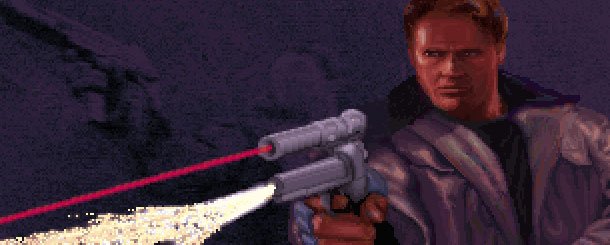
From 2010 to 2014 Richard Cobbett wrote Crapshoot, a column about rolling the dice to bring random obscure games back into the light. This time, it's Bethesda's Terminator game from the 1990s.
Before The Elder Scrolls hit the big leagues, Bethesda was best known as the company that made Terminator games—though not necessarily the best known Terminator games. The awful platform games, with the infuriating mechanic of having to shoot human enemies in the legs to maintain the second movie's no-killing rule? Other guys. The for-the-time-impressive light-gun game? Nope.
Instead—with the exception of the deservedly beloved FPS Future Shock, one of the first to combine on-foot action and vehicles in a way that actually made it fun to jump behind the wheel—none of them were particularly remembered. Admittedly, in the case of the action RPG-esque Terminator 2029 and Wolfenstein-level-teched FPS Terminator: Rampage, that's probably for the best.
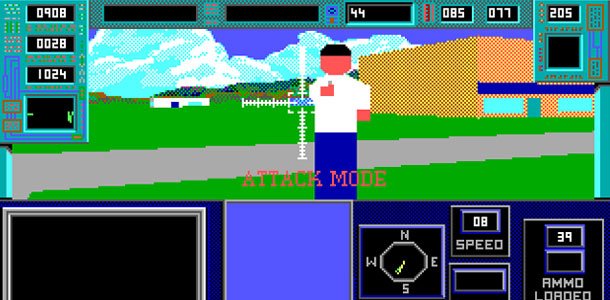
But their first attempt? It's the only Terminator game that lets you risk destroying humanity by buying Kyle Reese a pack of condoms while protecting Sarah Connor. How did that get forgotten?
The Terminator isn't a great game. It's buggy as hell, incredibly short, and however it ran on systems at the time, it stumbles like a dead dog under the mighty DOSBox. That doesn't mean it's not a game worth respecting. With nothing but 1990s 3D technology, it presented an open world action game set in modern-day Los Angeles, while even the mighty John Carmack was busily working on engines like this.
It's also a surprisingly advanced playground, with cars to drive, a map based on the actual city (or so it says here, though I wouldn't use it to try and get around the place in real life), interior locations like a shooting range and assorted stores to stock up on gear from, and even some RPG elements. In contrast, the most noteworthy thing about its similar looking rival Resolution 101, released around the same time and also offering urban combat in a sprawling city, is that that it makes you fight Daleks with boobs.
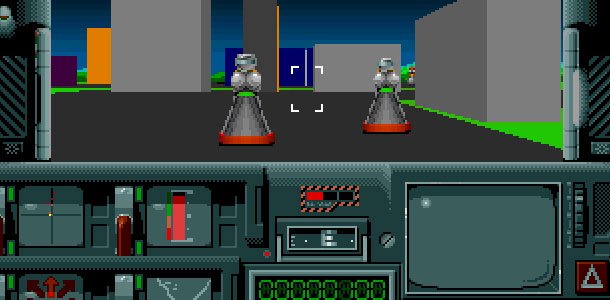
Rather than offering a campaign, missions and all the stuff you'd expect in the average shooter, The Terminator is a glorified duel. Whether you choose to be resistance hero Kyle or the implacable Terminator, both are simply dropped stark naked (though they've presumably at least found some trousers by the time the game starts) in the middle of Los Angeles on a mission to kill or be killed. Kyle teams up with Sarah, who can be ordered around and be equipment mule as the two are hunted around the city, while the Terminator is a ****ing Terminator. Needless to say, he's by far the easiest choice.
The biggest gaming news, reviews and hardware deals
Keep up to date with the most important stories and the best deals, as picked by the PC Gamer team.
Most of the game is spent preparing for that fight, and exploring a version of Los Angeles so large its map has Fast Travel. Most importantly, you need equipment, which you can get in a couple of ways—buying it or stealing it. Robbing a bank is guaranteed to get the cops on your back, indicated by the wonderfully coy phrasing "Come out of the bank please. The police are here and would like to have a word with you..." but is a good way to get set up if you have a getaway car to hand. Other destinations include the Gun Store, Hospital, Shooting Range, and most bizarrely, the Drug Store.
Normally, this wouldn't be that weird. And indeed, most of what it sells isn't. Stores in the game sell things like Running Shoes that speed you up, and the Compass that works like the Compass app on your phone and maybe even a compass. The Drug Store is your go-to place for handy items like a Crowbar to help you break into tougher buildings. So far, sounds like standard RPG economics. Right?
Except that unlike most games, stores in The Terminator don't just sell questing items.
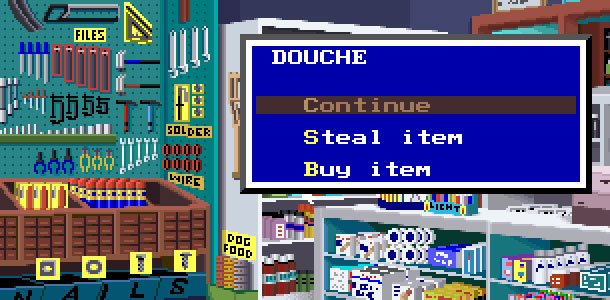
(And yes, that's where you'll find the condoms. No, sadly, they don't do anything.)
Tooled up, whether to take on the police or your rival, you quickly realise that the combat is both pretty janky and pretty awful, but very far from actually pretty. The most satisfying part about killing enemies is a little death cam in the bottom corner that shows them folding over, though the re-use of the same animations mean that methodically gunning down everyone in LA soon loses most of its appeal—even when you finally bump into Kyle Reese and obliterate his hilariously awful pudding-bowl haircut.
In an unusual twist, the easiest way to see the ending is to pick the other character and let them die. One side's lose sequence is the other's victory party—though thanks to the power of bad lightning effects, neither end up looking anything like as badass as the artists obviously intended.
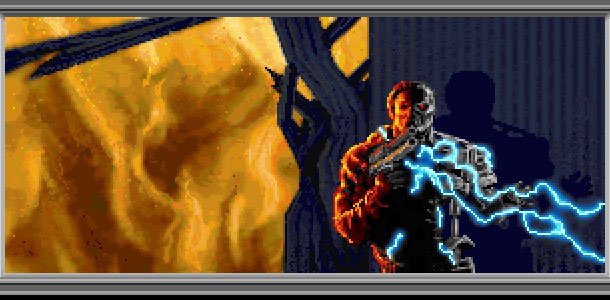
While the first two movies still stand up reasonably well, time definitely hasn't been kind to The Terminator. Playing it though, it's hard not to glance at most modern games' lists of objectives that boil down to 'walk onto this map pointer and maybe hit something while you're there' and wish they could be something more than the sum of their objectives. Where are the espionage games that give you a stack of resources and a mission to complete however you like? Where are the GTA games where important NPCs exist outside of cut-scenes, to be assassinated or not, and can be trailed and observed for your own benefit instead of just shot in the face on command? Where are the strategy games following the example of something like Jagged Alliance 2, which lets you be the one calling all the shots, but in a world with enough detail and narrative to let you troll the villain with a bouquet of flowers? Sigh.
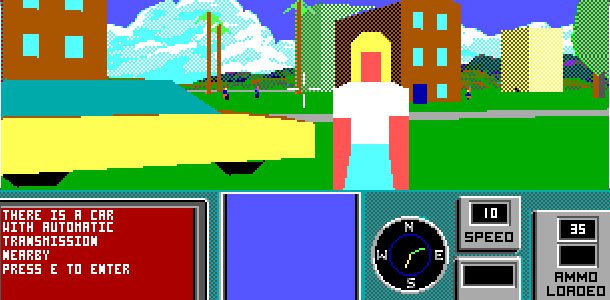
But I digress. If you only go back in time to play one Terminator game, obviously, it has to be Future Shock. The Terminator proper deserves far more credit than it's ever received though, at least for what it tried—even if it bit off more than the technology could chew. It's a rare example of a licensed game that tried to capture the spirit of the original, and bring us something new. Good or not, if this had been the pattern others had followed, and they'd tried this hard, just maybe... maybe... licensed games wouldn't have been condemned to be an industry joke.

